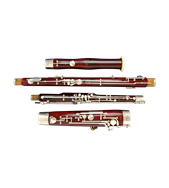When the time comes to sell your bassoon
April 26th, 2018

Second Hand Commission Sale Bassoons at Double Reed Ltd.
When the time comes to sell your bassoon
Everyone who purchases a bassoon at some point faces the task of selling it again. This could be because the bassoonist no longer plays or moves on to a better instrument.
Sometimes the gap between stopping playing and selling can be as long as decades, as the owner either cannot bear to part with the instrument or because of the anticipated trouble caused by selling it. And, rather more frequently than would be expected, sometimes the bassoonist never gets round to it at all and the bassoon is left for relatives to sell.
This guide looks at some of the issues to consider when the time comes to sell your bassoon.
Why sell your bassoon?
Perhaps the question to ask yourself before any others is: why sell your bassoon? Apart from the money you will receive, which will always be useful, the most often quoted reason for wanting to sell a bassoon is that the owner would rather have it loved and played by a new owner rather than languishing in a cupboard. There are lots of aspiring bassoonists out there looking for the opportunity to buy a bassoon (or a better bassoon) who would love to have your bassoon – so if yours is in the loft or under your bed, consider dusting it off and selling it.
The bassoon itself
Is the bassoon at its best in terms of playing condition and cosmetic presentation? It will be easier to sell if it has been overhauled or serviced, and the increase in value will be more than the cost of the service (although by whom it is serviced can impact upon this somewhat).
Does the bassoon have its accessories, and do they all work as they should? Nobody wants old reeds or pull-throughs, but the hand rest, crook(s) and case, plus the balance hanger, spike and other playing aids (if fitted) are all very important and costly to replace.
When all this has been attended to, is the bassoon a good example of its type in terms of intonation, evenness, free-blowingness, and so on? A poor example will be more difficult to sell and/or costly to improve. This often comes down to selecting the right bassoon in the first place (buying from a reputable supplier and taking advice are important here) and then looking after it.
The most significant impact on the preservation of the playing quality of a bassoon is the degree to which moisture is kept at bay - by swabbing the bassoon out after playing, leaving the case slightly open when possible and so on – as although maple is a hardwood it is not impervious to damp.
Comment: If we sell a bassoon on commission we much prefer to have the bassoon given to us in its “raw” state so that we can ensure that the work carried out meets the standards expected by prospective purchasers in order to maximise the price. Too often we find work carried out by local woodwind repairers has to be re-done in part because the work was carried out according to their usual standards (to keep a bassoon going rather than to sell it) and preparing a bassoon for sale is rather different.
The bassoon’s provenance
Much like buying a car, a prospective purchaser will always be interested in where the bassoon came from and who played it. Paperwork relating to when the bassoon was purchased, invoices for servicing or other work carried out on it (upgrades, for example) can be helpful. If you do not have the paperwork, then some facts about when you bought it and where from will help as well.
If it is a professional-standard bassoon, then any information you can give about who played it or in which orchestra it was played will be useful.
The presence of the original maker’s badges and the serial number are useful in order to demonstrate provenance and help to pinpoint when it was made and other useful information. Bassoons are not impossible to sell without some of these at least, or other methods of proving provenance, but lack of them may affect the price and the time they take to sell.
Comment: in order to protect all parties and ensure a smooth sale, we will not take on a bassoon for sale without at least some marks on the instrument to allow us and prospective purchasers to be confident in what they are purchasing.
How easy is it to sell a bassoon yourself?
If you have a colleague, student, teacher or other person you know who is looking for a bassoon of your type and you can agree terms, then it should be relatively easy to sell a bassoon yourself.
Failing this, eBay or other auction sites are realistically the only other places to sell a bassoon. However, almost anyone serious about buying a bassoon will want to try it in their own home for an extended period and show it to a teacher. Very few bassoonists have the knowledge or experience to make a decision about a bassoon via pictures and a description on the internet or via a quick play in someone’s front room. Even if you were willing to lend an instrument to a stranger before buying, these auction sites are not set up to facilitate an arrangement of this type.
Comment: eBay and similar sites are suitable only for those prepared to accept a low price, as prospective purchasers will be looking for bargains to compensate for the risk of buying the wrong instrument. In other words, unless you have a very poor instrument to sell (i.e. something unplayable from an inferior maker), you will be unable obtain the best price for your instrument via auction sites.
What about selling on commission?
The route which many vendors take is to sell their bassoons through specialist retailers such as ourselves. A reputable retailer with specialist servicing and bassoon preparation capabilities will be able to obtain a good market price for your instrument. The bassoon will need to be serviced and prepared for sale meticulously to obtain the best price, and then advertised by the retailer with photographs and a description showing the instrument to best advantage.
The cost of servicing will need to be deducted from the sale price obtained as well as the commission (normally a percentage of the sale price). Costs for servicing vary as do commission rates, but bear both in mind when making a decision about the retailer to use. However, the ability to achieve the best sale price can more than outweigh difference in servicing and commission costs so look at the steps a retailer takes to obtain the best prices for their vendors.
There is normally a trade-off between the price achieved (not always the price the instrument is advertised for initially of course) and the time it takes to sell an instrument - the higher the price the longer it takes to sell, other things being equal - so discuss your price requirements carefully with the retailer rather than just accepting a price suggested, and come to a mutually-agreed price bearing in mind how quickly ideally you would like to achieve a sale.
When selecting a retailer through which to sell your bassoon, examine the way they will go about doing this for you. Here are a few suggestions:
- Review their website – is it friendly, professional, informative and demonstrate knowledge about, and a passion for, bassoons?
- Review their commission sale contract and commission rates. If these are not available on their website ask yourself why the retailer does not want to share them. If they are available, is the contract fair, comprehensive, afford you protection, commit to paying you shortly after a sale is achieved, and so on?
- Does the retailer make you pay up-front for servicing your bassoon, or can you pay when the bassoon is sold, with the amount taken from the proceeds of the sale?
- How well does the retailer present bassoons they have for sale on their website? Are the pictures of the bassoons good quality, showing them to best advantage? Is the description comprehensive and clear? What else does the retailer do to promote the bassoons they have for sale?
- How professional is their bassoon loan scheme – is it safe and secure with a proper agreement in place between retailer and borrower?
- Finally, phone them up – is the person who answers the phone professional, knowledgeable (about bassoons generally and about a specific bassoon they have for sale in particular) and friendly? Would you be happy for this person to talk to potential customers about your bassoon and would they do it effectively?
A positive answer to the above will give your bassoon the best chance of being sold quickly for the highest price.
Are there any other alternatives?
Uniquely (as far as we are aware) we buy bassoons for re-sale as a matter of course. If you wish to obtain an immediate decision and the money straightaway, talk to us about buying your bassoon from you.
We will offer you a fair price taking into account the cost of servicing/overhauling and providing a new case plus anything else necessary. The price is unlikely to be as much as you would receive for selling it on commission, but you do get the money immediately and it relieves you of the worry about selling it.
Want to sell your bassoon? Read more about how it works: Sell Your Bassoon
Article Author: Martin Ludlow, In-House-Bassoon Specialist and Director at Double Reed Ltd.

Meet the team


